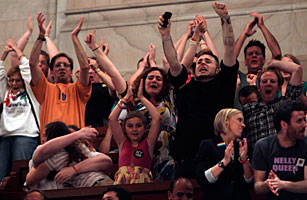
The most surprising thing about Friday’s vote by lawmakers in Albany to make New York America’s sixth and largest state where gays can marry one another is not that Gov. Andrew Cuomo, in a patient display of vote-counting that would have impressed Lyndon Johnson, peeled off enough Republican Senators to pass his bill. Instead, what was most eye-raising was how quickly opponents of gay marriage had shape-shifted their arguments to try to stave off a legislative vote that would be additional proof that gay marriage is not merely a product of the “runaway” judiciary they have blamed for the so long.
When New York’s state Senate passed the bill, 33-to-29, cheers of “U.S.A.! U.S.A.!” erupted in the chamber. The historic vote followed an 80-to-63 vote in the state Assembly last week — and more than a week of parliamentary maneuvers by conservatives and Republicans to keep the bill from coming to a vote. In the end, the Senate passed the bill into law despite a Republican majority and despite the G.O.P. making gains in the 2008 election. Although gay marriage has yet to win a single statewide referendum, its legislative success in New York on Friday shows that it is quickly advancing in nearly every other way, from legal victories in California courts and throughout the federal judiciary to an increasingly enthusiastic ally in the White House.
Cuomo’s full-on blitz in Albany has been a powerful example of the kind of power a governor can wield when he fully commits himself to a legislative goal. Just six months into his first office, the fight over gay rights will almost certainly be a defining one for his first term. It puts to rest worries expressed last year by gay rights activists with long memories who fretted that Cuomo’s lukewarm embrace of gay issues while working for his father, the former Gov. Mario Cuomo. What they were worried about was electing someone who said what they perceived to be the “right things” on gay rights, but wasn’t willing to do the head-knocking and name-taking that it often takes to make policy aspirations into new law. He’s passed that test, and over the past week of working with clergy and their allied legislators to strengthen religious exemptions, he’s shown he knows how to negotiate, too. On June 17, a knot of Republicans in the New York Senate had demanded the religious exemptions in the bill — already present in the version passed by the Assembly — be further expanded to ameliorate what they said was the coercive nature of the proposed law and the potential exposure of religious institutions to lawsuits for refusing to accommodate same-sex couples. One legislator reportedly called the demand his “line in the sand.”
But in war, every victory creates winners and losers — and losers can often become enemies. So the stakes are high for Cuomo, as losers aren’t likely to forget this week anytime soon.
In this case, those with powerful memories would include the influential Archbishop Timothy Dolan of New York, who chose to issue a rallying cry on his blog last week that cast the debate in a novel but bellicose way. “We are living in New York, in the United States of America — not in China or North Korea,” said Dolan a few hours before Cuomo formally introduced his bill. “In those countries, government presumes daily to ‘redefine’ rights, relationships, values, and natural law. There, communiques from the government can dictate the size of families, who lives and who dies, and what the very definition of ‘family’ and ‘marriage’ means.” It was Dolan’s declarations that most likely helped etch the Republican line in the sand.
Even though many opponents of gay marriage, including leading religious thinkers, have long predicted that wider legal and social acceptance of gay marriage is only a matter of time, Dolan’s call was part of a furious push back from conservatives who warned defecting Republicans that they would be punished at the polls for their apostasy in supporting gay marriage, a goal-line defense that kept lawmakers in session several days beyond when the session was expected to end. The intensity of his opposition to gay marriage is not new — Catholic prelates and many other religious thinkers have argued that the legalization of same-sex marriage could be the undoing of Western Civilization. What is new is his attempt to cast the struggle in a thoroughly libertarian, Tea Party-friendly style. The words “government” and “dictate” and “presumes” — and not to mention, “China” and “North Korea” — were easily reminiscent of language about the tyranny of the federal government popularized since 2008 by some Tea Party members and embraced by many of the most influential GOP politicians, from Texas Gov. Rick Perry to Sen. Rand Paul in Kentucky.See a visual history of the gay-rights movement.See how the battle for gay marriage could affect the White House.